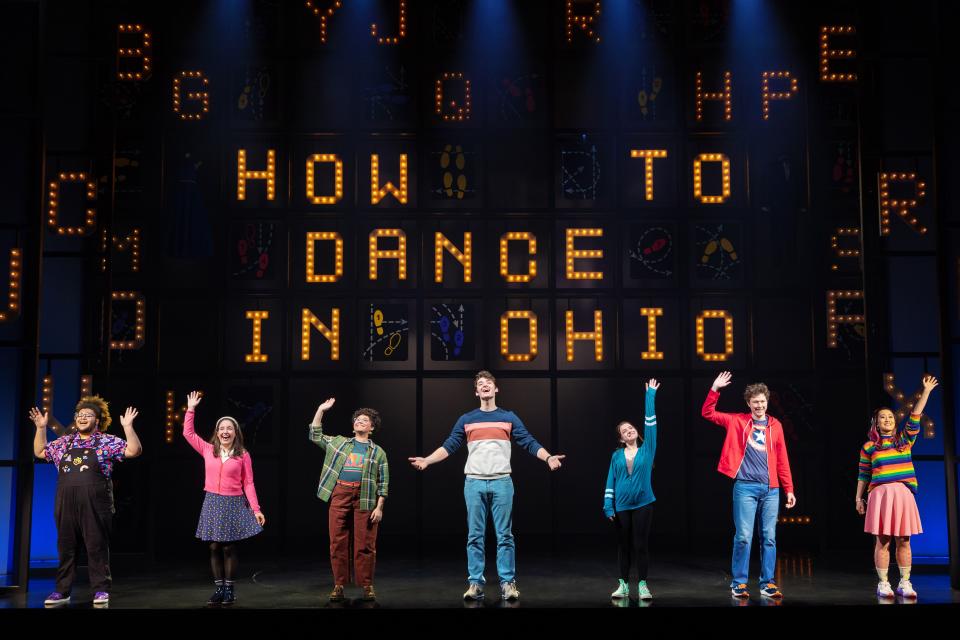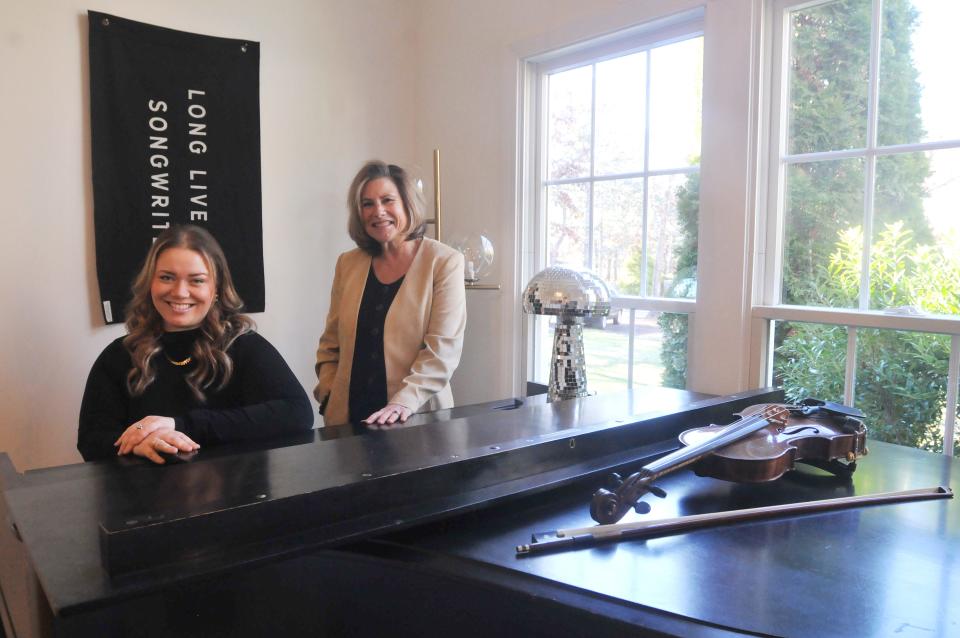'Historic moment': Cape entertainers help co-produce Broadway show with autistic youth
On their first Broadway opening night as co-producers, Isabeau Miller and Tedi Marsh sat next to a young woman and her mother watching their lives being portrayed on stage. Sitting in front of them were parents of one of the lead actors.
That was their perspective in mid-December for the groundbreaking “How to Dance in Ohio,” a musical that tells the based-on-real-life story of seven young adults on the autism spectrum as they go through a universal rite of passage: preparing for their first formal dance. In a Broadway milestone, those characters are portrayed by performers who are also autistic. All are making their Broadway debuts in a feel-good show that TheaterMania called a “game-changer for accessibility.”
Marsh and Miller, a mother and daughter who are Mashpee neighbors and entertainers themselves, said the opening-night audience reaction was emotional, love-filled and joyful.
“This is a historic moment for theater and for representation. The neurodivergent group has never been represented in this way,” Miller said of both the show’s story and cast. “We knew this would be a family-friendly show that would allow some young people to see themselves portrayed on stage for the first time.”
The night was particularly affecting, she and Marsh said, when the young adults featured in the 2015 Peabody Award-winning “How to Dance in Ohio” documentary film joined the curtain call with the actors telling their stories.

Documentary filmmaker Alexandra Shiva had focused on how people on the autism spectrum at a Columbus family-counseling center were different from each other, and from neurotypical people, in relating to the world and in social situations like a dance. In 2017, she approved two Ohio natives — composer Jacob Yandura, who has an autistic sister, and bookwriter/lyricist Rebekah Greer Melocik — to musicalize her film. The project was championed and developed by legendary Broadway producer/director Harold “Hal” Prince until his death in 2019. After the pandemic, director Sammi Cannold, whose brother is autistic, brought the “How to Dance” musical to its Syracuse, New York premiere in September 2022.
Marsh and Miller’s personal connection to autism is through cousins and the children of friends, but their interest in helping to bring “How to Dance” to Broadway is summarized in the mission for their new Songbird Productions company: to champion “a generational legacy of authentic storytelling.”
Investing money and time was not “just us being part of any (Broadway) show but being a part of something that was going to change the landscape of theater,” Miller said.
Even if the show doesn’t succeed financially, she calls it a win for elevating neurodivergent people on and off stage, and notes, “Hopefully there comes a day when this isn’t groundbreaking.”
Artistic pursuits are a family legacy

Miller and Marsh are part of an arts-oriented family that reaches back to vaudeville theater. Marsh has sung around the world, and last fall released a Christmas album. Miller is a formerly Nashville-based pop musician/songwriter and entrepreneur who relocated with her musician husband, Shaun Balin, and three sons to her childhood Cape Cod home during the pandemic. She teaches part-time at her alma mater of Berklee College of Music in Boston, and is writing two musicals of her own. Marsh, Miller and Balin have all performed locally at Cotuit Center for the Arts, and 11-year-old son Beckham has performed in Cape community theater.
Miller and Marsh got involved last August with bringing “How to Dance” to Broadway through Tom D’Angora, Marsh’s former Falmouth voice student who became a friend. He went on to produce award-winning off-Broadway shows that include long-running “NEWSical the Musical,” and to produce/co-direct 2005’s “A Broadway Diva Christmas” in which Marsh co-starred.
D’Angora had suggested co-producing before, but “How to Dance” was the one that inspired Miller and Marsh to say yes. They have invested money, been part of twice-weekly national Zoom production meetings and training on neurodivergence, and worked to raise awareness and financing. Marsh traveled to watch the show develop in rehearsal and previews.
Launching 'How to Dance in Ohio' in NYC
The “How to Dance” performers were introduced nationally when they performed at the Macy’s Thanksgiving Day Parade. That weekend, Marsh had helped get preview tickets for a family whose daughter, Ava, works as an intern on the Cotuit center’s Art Bus, and entertained at Marsh's 6-year-old grandson’s birthday party.
Ava’s mother, Susan Battista, said “How to Dance” became part of an emotional six-month journey to get Ava, 22 and on the autism spectrum, living on her own after graduating from Sandwich’s Riverview School. When Ava was diagnosed as a baby, Battista said, a Boston doctor told her that most autistic children had previously been institutionalized.
“The idea that they could be the stars of a (Broadway) show on the topic of autism just really made me realize how far we’ve come in a generation in accepting, celebrating and understanding differences,” she says. “And how much hope there is for Ava and everyone who comes after who gets the diagnosis. It’s a different world.”
Battista praises the show’s discussion of, and accommodation for, neurodivergent people, including a quiet room for patrons who need a break.
And Ava?
“From her perspective, it was ‘They are people like me and they can be Broadway stars, too,’” Battista said. “I think it really makes people see there's no limit to what you can do.”
Marsh is working with a local mother active within the Cape autism community, and with state Sen. Susan Moran, D-Falmouth, to provide similar opportunities to see “How to Dance” for other local young people. Through being part of this show, Marsh said she learned "so much" about autism on the Cape.
Before “How to Dance,” Miller’s family had watched TV shows about neurodivergent people to gain a better understanding, and that’s also what the Broadway show can offer to audience members. Well beyond that, though, she and Marsh emphasize, the show's story is relatable to anyone simply trying to understand life.
“It’s a show about triumph over challenges. It's a show about families figuring out how to be the best mom and dad and son and daughter to one another,” said Miller, who plans to take her 11- and 6-year-old sons to the Broadway show soon. “It’s about nonconformity and being open to the spaces that we all live in. This isn't a show about autism –– this is a show about life, and it just happens that the people living the life in this show are autistic.”
Thanks to our subscribers, who help make this coverage possible. If you are not a subscriber, please consider supporting quality local journalism with a Cape Cod Times subscription. Here are our subscription plans.
This article originally appeared on Cape Cod Times: Broadway show about, and starring, autistic young people has Cape ties
